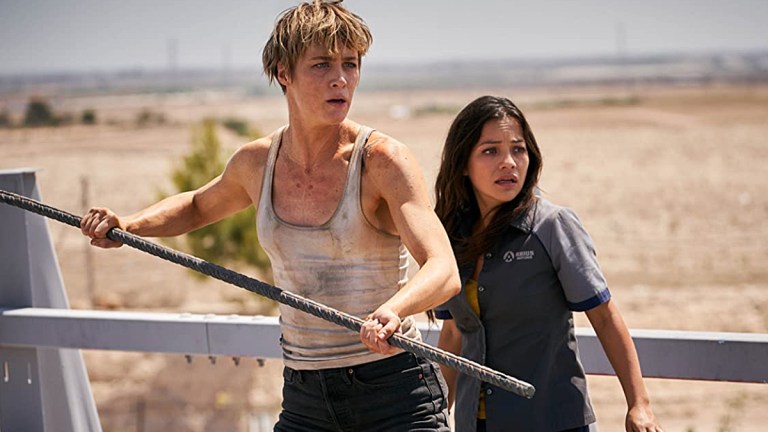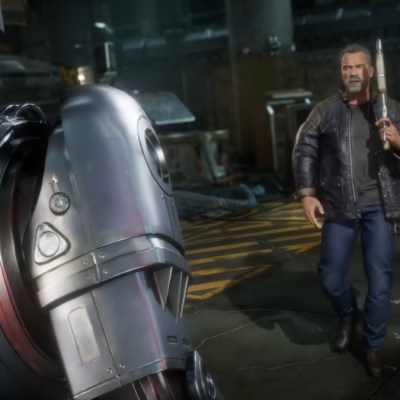Terminator 7 Would Have Introduced an Alternate Timeline
Terminator: Dark Fate star Mackenzie Davis reveals the twist that the now-nixed follow-up film would have brandished.

While the box office performance of 2019’s Terminator: Dark Fate resulted in the franchise getting lowered into a proverbial vat of lava as it flashed a thumb-up, it seems that plans exist for a seventh entry, which would have followed up on the wantonly retconned storyline—indirectly, anyway.
Mackenzie Davis, who starred in Dark Fate (Terminator 6, if you will,) as cybernetically-enhanced human Grace, divulged a rather intriguing tidbit on the Happy Sad Confused podcast about the inevitably fruitless plans for a follow-up film. The character, hailing from a timeline altered by Terminator 2’s destruction of Skynet, was sent from the future to protect the fated Dani Ramos (Natalia Reyes) from a new humanity-exterminating A.I. called Legion, but was (SPOILER ALERT) killed at the end of the film. Yet, Davis reveals that Grace would have returned in the next film by way of yet another alternate timeline.
While not getting too specific about the hypothetical Terminator 7 plans, Davis explains to host Josh Horowitz, “It was gonna be a sort of timeline thing, where there’d be another timeline that you’d explore. Like, there’s no resurrection, but she came from the future, so…” However, in a key caveat to this latest alternate timeline setup, Davis confirms that the film would have taken place in the future.
Of course, Dark Fate itself, directed by Deadpool’s Tim Miller, was the product of loose play with the established timeline, since it ignores the apocalyptic events of 2003’s Terminator 3: Rise of the Machines, 2008-2009 Fox television series Terminator: The Sarah Connor Chronicles, the future-set prequel warfare of 2009’s Terminator Salvation, and even the recent timeline-altered events of 2015’s Terminator Genisys. Rather, the story was built upon the timeline of director James Cameron’s 1984 original film and the creative and financial apex of the franchise, 1991’s Terminator 2: Judgment Day, in which Sarah Connor (Linda Hamilton) and fated son John Connor (Edward Furlong), aided by a reprogrammed T-800 (Arnold Schwarzenegger), seemingly erased the existence of A.I. Skynet—and in doing so changed the future, and fulfilled the franchise motto, “There’s no fate but what we make for ourselves.”
However, fate took a tumble during the inciting incident of Dark Fate—seen by detractors as its cardinal sin—in which a CGI-conjured T2-era John is coldly and unceremoniously shot to death by another T-800 that Skynet had managed to send back in time to perpetuate its own existence. Ironically enough, Skynet’s act of successfully killing John led to the creation of a new timeline in which it no longer exists; one that is instead dominated by the similarly-motivated Legion. Thus, Davis’s quasi-cyborg Grace arrives from this new future seeking to protect new resistance savior Dani, setting up a familiar dynamic (also featuring Hamilton’s Sarah and Schwarzenegger’s “Carl,” the no-longer-murdery T-800 who killed John,) decorated by new elements like the hybrid cyborg endoskeleton/liquid metal killer, Rev-9 (Gabriel Luna).
Eventually, after sacrificial demises by both Grace and Carl, Dark Fate had seemingly positioned subsequent entries to center on Dani, who, joined by Sarah, emerged from her ordeal as the targeted chosen one as the tough, tested leader she was fated to become. Pertinently, the film concludes with the duo finding Grace as a carefree child in a playground in the present, determined to change her fate; an aspect that might be the key factor in Davis’s description of Grace eventually returning in the next film by way of an alternate timeline, perhaps designed to follow the version of Grace shaped by Dani and Sarah’s protective efforts. Yet, it wouldn’t be the Terminator franchise without homicidal cyborgs spawned from a world-wrecking A.I., so there’s a lot on which to speculate regarding the threat attached to the seventh film.
Regardless, Terminator 7‘s chances of ever getting made are extremely slim, primarily because Dark Fate proved to be a dud upon its October 23, 2019 release, after which it went on to gross $261 million worldwide ($62 million domestic), which, after costs, barely left the Skydance-produced, Paramount-distributed film in the black against an exorbitant $185 million budget. Even Linda Hamilton—who had reluctantly returned for Dark Fate—recently declared herself “done” with the franchise due to the rapid evolution of audiences and the increasing perils of high-risk blockbusters; an aspect that has increased exponentially with the ongoing effects of the pandemic on the theater industry. Moreover, in an interview with NME this past June, Davis herself responded to the notion of a Dark Fate follow-up by emphatically saying, “Oh my god no, that’s insane!”
Ultimately, Dark Fate may have paired impressive, innovative action sequences with a disciplined level of fan service, but—like immediate predecessor Genisys—it reflects the ongoing muddling of an already-convoluted canon; one that irreparably damaged the branding, relegating the groundbreaking action/sci-fi classic to a fatuous loop of self-parody. Indeed, the inherent flexibility of its timeline has created a conceit that each iteration must radically redefine the canon rather than follow a natural storyline progression. Likewise, despite its dearth of details, Davis’s description of Terminator 7‘s setting in a future alternate timeline sounds like a concept that defiantly doubles-down on the franchise’s ailments.

